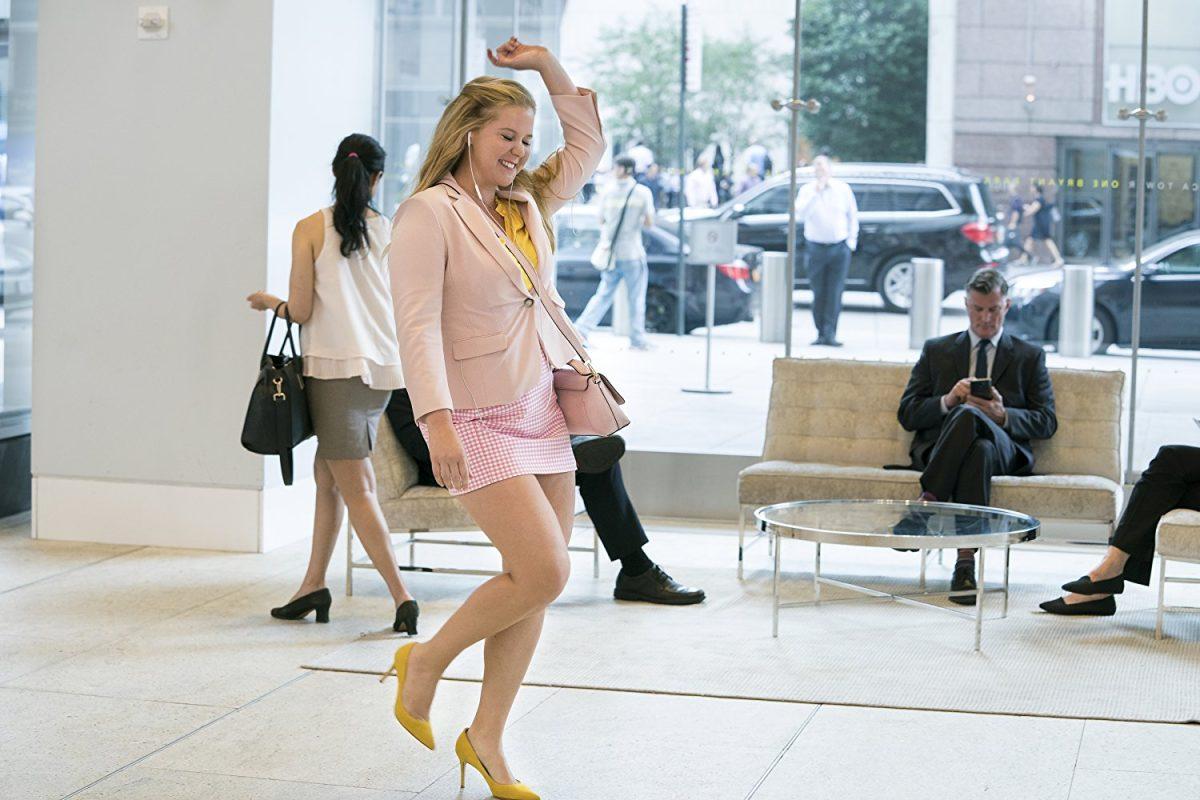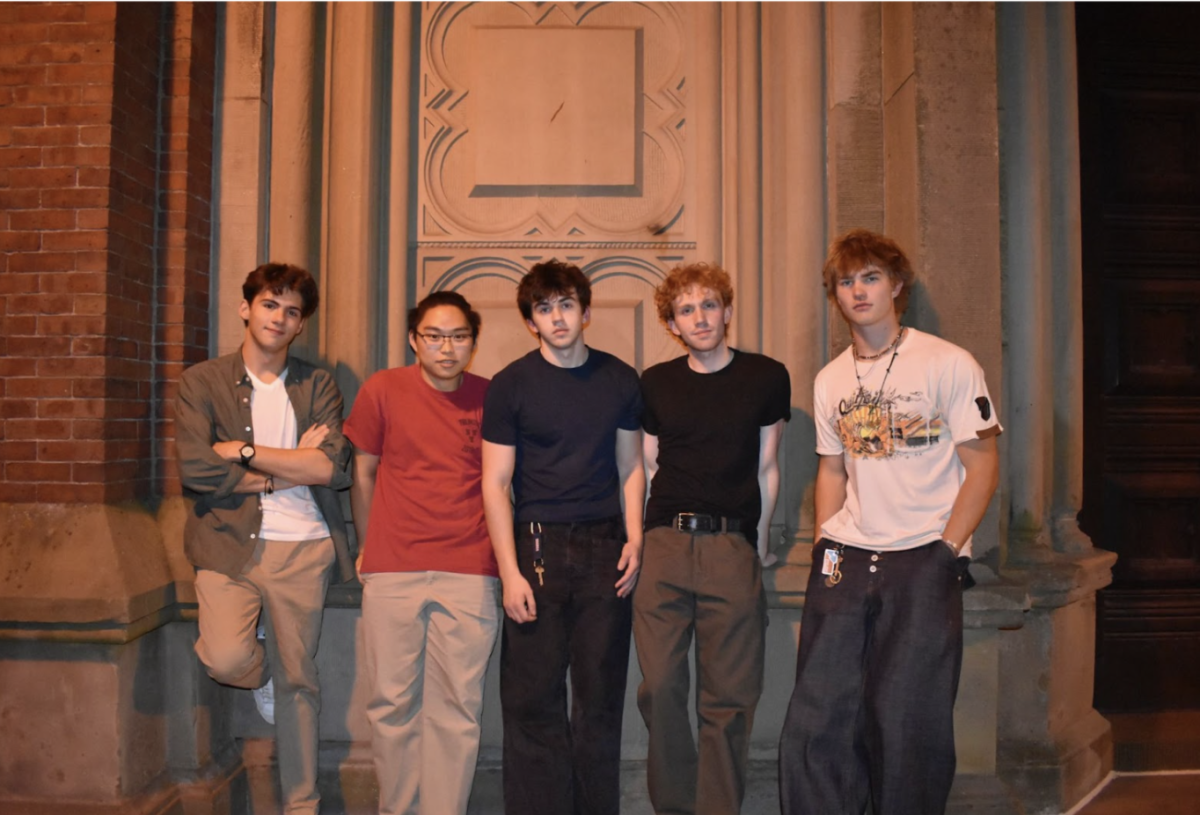Early in “I Feel Pretty,” Renee Bennett (Amy Schumer) comes home from a night out with friends — in which no man pays her any mind, and she can barely even get the bartender’s attention— and stands undressed in front of the mirror, critically examining her Spanx-clad body. Such self-doubt is familiar to many women, and the film is full of small moments like this one that tug at your heartstrings. In spite of such moments, the overall message of “I Feel Pretty” is not as powerful as it first seems, although the film is fun to watch and oftentimes laugh-out-loud funny.
Protagonist Renee works in the digital department of upscale cosmetics company Lily LeClaire. Her office is located in the basement instead of in the company’s extravagant headquarters. She struggles with body image issues and low self-esteem; a boutique salesgirl informs her that she could “probably find [her] size online,” the photo she and her two friends Vivian and Jane (Aidy Bryant and Busy Philipps, respectively) post on a dating site gets no views and at a SoulCycle class, she nearly dives under the counter in embarrassment when forced to ask for a “double-wide” shoe. Scenes such as these exemplify everyday scenarios in which she feels less than; Renee fantasizes about being beautiful and imagines how much easier her life would be if she were, at one point explaining how she has “always wondered what it feels like to be just undeniably pretty.”
Renee’s life changes thanks to a fateful SoulCycle class. During a spin routine, she falls, hits her head hard on a bike and wakes up believing that she is as beautiful as the women in the Cosmo magazines she reads and the YouTube tutorials she watches. While she doesn’t actually look any different, she gains a new level of confidence. Of course, she eventually hits her head again and returns to her normal state of mind, but in the meantime, her life turns around: she gets a new job as a receptionist at Lily LeClaire, right in the center of the luxurious office and finds a new boyfriend.
The most entertaining part of “I Feel Pretty” is Schumer herself, who is adept at weaseling her way into situations so awkward they are almost painful to watch. While her comedic timing is perfect and her gait while toddling out of a SoulCycle class after splitting her pants is hilarious, she also pulls off quieter, more serious moments like the one in front of the mirror. We have not seen this more vulnerable side of Schumer before in her previous films, including “Trainwreck” and “Snatched.” Yet here, she easily gains the audience’s sympathy and laughter in turn.
Michelle Williams as CEO Avery LeClaire is also a joy to watch. She glides on-screen and immediately shocks the audience with a high-pitched, squeaky voice unlike any I’ve ever heard her use. LeClaire is the kind of woman who literally cannot pronounce the word “Kohl’s” and, when she comes upon Renee eating lunch, says breezily, “Ah, Renee, I thought I smelled animal products.” It is clear that Williams is thoroughly enjoying herself in a comedic role, and I was pleasantly surprised at how well she fit it.
The film’s most glaring problem becomes evident during its climax, when Renee realizes that she actually looked the same the whole time and her career achievements were due to her own strength and ability, not her looks. It’s a touching sentiment. Unfortunately, it occurs onstage at a huge product reveal for Lily LeClaire, and Renee uses her newfound confidence to encourage the audience to buy LeClaire cosmetics. It seems like a vicious Catch-22: she finally realizes that physical beauty is not what matters, and so… she encourages her listeners to buy her cosmetics in order to first “fix” their outward appearances before then addressing their internal beauty? Her newfound power leads her to turn right around and continue selling cosmetics as a path to internal strength rather than extolling the many virtues of internal strength on its own. This approach insinuates that it’s the responsibility of women to overcome unhealthy societal beauty standards and be confident without denouncing the ridiculous beauty standards themselves.
Renee’s very presence on-stage is also due to a questionable plot choice, as the only reason her supervisor promoted her is because Lily LeClaire is creating a lower-end product line in an attempt to expand their reach to a new target demographic: girls who don’t “have high-end makeup brushes” and “put their makeup on in the rearview mirror”—girls like Renee. When LeClaire looks at her, you can practically see dollar signs flashing in her eyes.
On the surface, “I Feel Pretty” is good for a laugh and for some entertaining Amy Schumer comedy. However, there are deeper problems that the film does not address, like the failure to question Renee’s pitch that cosmetics have life-transforming capabilities. Ultimately, it still conforms to an extremely narrow and overwhelmingly white definition of beauty. Vivian aptly sums up one of the film’s greatest frustrations when she asks Renee “Why do you think everyone cares what you look like?” Undoubtedly, society is cruel to women who do not fit its specific notions of beauty, and many women suffer from low self-esteem and body image issues. But oftentimes, these perspectives are imposed on us by the media and by the likes of the very cosmetics company for which Renee works. Her job — convincing women they need cosmetics to look beautiful and/or change their lives — is, in fact, the reason why she is so insecure about her appearance in the first place. It’s a vicious cycle that “I Feel Pretty” propagates far more than it questions.






